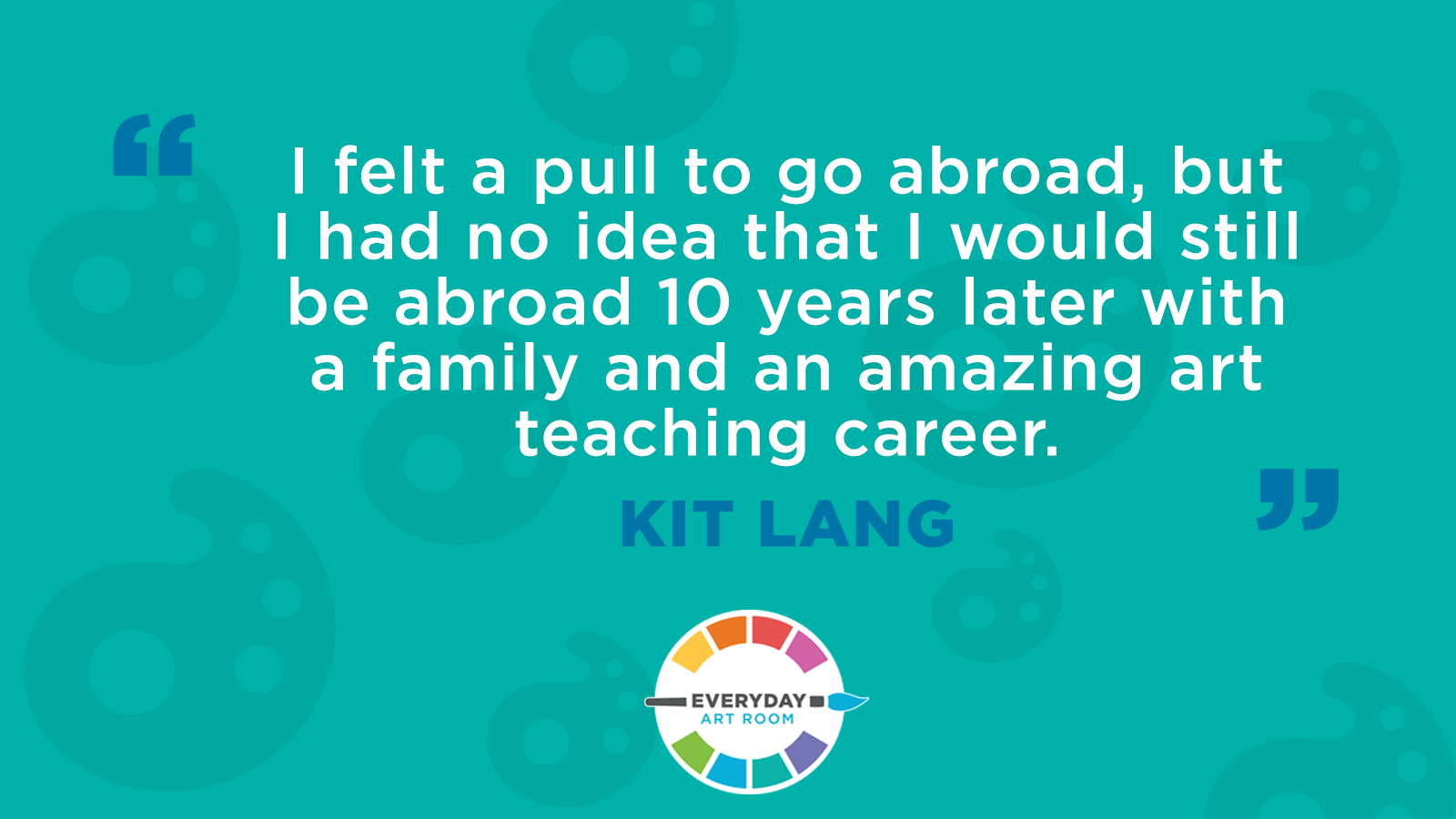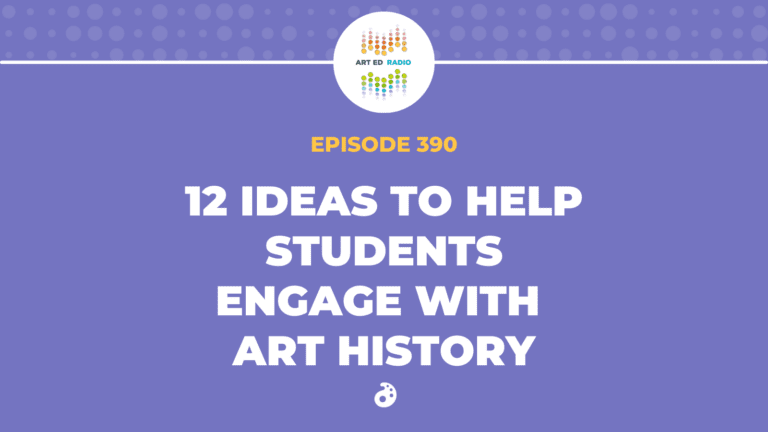Teaching abroad is an exciting opportunity, but one that comes with its own unique set of challenges. In today’s episode, Nic welcomes on Kit Lang to discuss her experiences teaching overseas for the past 10 years. Listen as they discuss how to find an overseas job, the pros and cons of teaching in another country, and creating a community wherever you are. Full Episode Transcript Below.
Resources and Links
- Follow Kit on Instagram
- Kit’s blog can be found here
- Teaching Art Around the World (with links to all 6 parts of the series)
- Making Travel a Part of Your Teaching

Transcript
Nic: Amanda Heyn has some articles on the Art of Education University Magazine. It’s titled Teaching Art Around the World. She has Teaching Art Around the World from South Korea, Germany, India, Ethiopia, Thailand, Norway, all different areas of our world. I remember when these articles were coming out and how I was so thirsty for the next one to come out as soon as I finished reading the first one. I think it’s so important to understand what’s happening in education outside of your district and your state and even your nation. It’s important to understand kind of the insights of other people and what they’re doing in their classrooms.
Today we are going to interview Kit Lang. She is an educator who is working in Hong Kong presently. She is known on Instagram as Ms. Kit Lang and has some amazing content on her Instagram. She has some wonderful insight and advice to give us about teaching in an international school. This is Nic Hahn. This is Everyday Art Room.
All right. Thanks for joining us today. I’d love to hear kind of your background right now and just tell me a little bit about yourself, Kit.
Kit: I am currently the lower primary visual art teacher at Hong Kong International School. I am originally from Grand Rapids, Michigan. That’s where I received my bachelor’s of science in visual art education, K through 12 at Central Michigan University. Go Chips. That was in 2008. I later received my masters of arts educational leadership from Boston University in 2018. That’s a little bit about my background, where I’m from and where I currently am now.
Nic: That was kind of your beginning. I like it. But I know that you are no longer in Michigan. You’re teaching abroad right now. Can you tell us more about the catalyst of how you moved into this phase of your life? Why did you move? Why are you teaching abroad?
Kit: After I graduated in 2008, I find myself in the biggest recession looking for a job. I was not landing one. I figured if I couldn’t find a teaching job in Michigan, I would look further afield, looked at teaching opportunities out of state. But then I thought, “If I’m looking out of state, why not go further?” I started to look at international teaching opportunities. I love to travel. I packed up my 1998 Ford Escort and drove to an international teacher recruitment fair in Philadelphia in February, white-knuckle driving the whole way, little blizzardy.
If you’ve never been to an international teacher recruitment fair, it looks like a cattle call. You’ve got a gymnasium or a conference room in a hotel and the parameter of the room is lined with tables of schools and their admin, HR. You have a one-minute elevator pitch to sell yourself and to get an interview to tell them why you should work at their school. I found myself handing out resumes and one school, not just one, a few said, “Let me save you the paper, the ink and the staple and give you back your resume because we don’t look at any resume or any teacher that doesn’t have a minimum of two years experience.”
That was a long cold drive back to the mitten state and a lot of time thinking about how can I continue this journey abroad to teach abroad? I did have my TEFL certification, so I lent on that a bit and started looking at teaching opportunities to teach English. I found an opportunity with Disney English, teaching English using Disney songs, stories and characters. Because I know pretty much every Disney song ever, I thought this was perfect. A good chance to just get into a situation where I’m teaching, using my experience and being abroad in a new country and allowed to travel and experience. That was the catalyst to get me abroad.
Nic: Can I interrupt? Sorry, the Disney English. Now did you discover that in just like all the research that you were doing finding a job? Because that’s something that’s new to me.
Kit: Yeah. I was looking at different opportunities online. I put my resume out there at different websites and recruiters that look for teachers to teach English. Disney was just one organization under the umbrella of Disney Publishing. They had a lot of Disney content that they had created to teach English. They decided to create centers to then have children come to their centers as an afterschool extracurricular activity for children to teach them English.
Yeah, it was a great experience. I loved it. It was using jazz hands and very magical edutainment, which I loved. I worked with them for four years. I managed to work my way up to do more training of the Disney English teachers. Met my husband and we then were relocated to Hong Kong in 2013. That’s when I thought, “Right, I need to get back into the art room. I want to use my degree. I miss teaching art full-time.” That was when I started substitute teaching at international schools, trying to get contacts. I even proctored exams in a gymnasium with 400 students and watched children take exams just in the hopes I could meet some contacts at schools.
Thankfully one of those contacts took a chance on me and gave me my first teaching position. I worked at an international school in Hong Kong for three years getting that experience. Then I moved to the now school that I am at currently and have been teaching there. This is my third year. I kind of circumnavigated the two years experience that was required and just moved to the country that I was trying to get a job in. But that’s a little bit about my own meandering experience of landing myself where I am today.
Nic: Yeah. Wow. What a fun and adventurous path though. I mean, could you ever have seen this in yourself? Was this something that you just like, I don’t know, it just fell upon you?
Kit: Yeah, I knew I wanted to live and teach abroad at some point. I had this pull to go abroad, but I had no idea that it would be now 10 years on and I would be having a family and continuing my art teaching career abroad still. I just reached my 10-year Chinaversary living abroad as an expat. If you would have asked me back in 2008 when I bought that one-way plane ticket to Shanghai, China, I probably wouldn’t have thought it would turn into 10 years. But that’s how life works, I guess. The next opportunity presents itself and 10 years on, having gone to that recruitment fair in Philadelphia, I’m now currently in my dream job. It took a while to get here, but I picked up a husband along the way.
Nic: Nice.
Kit: Lots of travel and experience along the way as well.
Nic: Yeah, that’s great. Now, you’ve talked about like the experience of getting to where you’re at, but can we talk a little bit about the pros and cons of actually living abroad and just having this life that you’ve created? I’m sure that there’s plenty of pros, but probably also some cons along with it, huh?
Kit: Yeah, one of the big pros and I kind of touched on it, is being in a different country, a different culture, is it a credible opportunity to grow as a person, but also as an artist. I am being exposed to a lot of different visual stimuli. I’m bringing these new experiences from my travels into my teaching and also my own art practices. That’s a huge plus. Again, the ability to travel and continue to explore on your holidays and your vacations, going to different surrounding countries is easy to do.
One of the cons though is being away from family and friends.
Nic: Sure.
Kit: It’s hard to live away from those, the family and friends and missing birthdays and weddings and celebrations. That’s tough. But thanks to technology, it makes it a bit easier. Having seven weeks of vacation in the summer, I always make my pilgrimage back to Michigan every summer. Having that chunk of time as a teacher does help it be more manageable throughout the year to be away from those family and friends. Because you get a large bit of time to go and see them and visit and reconnect.
Nic: Yeah, that makes sense. All of it. I can imagine that you probably develop new families along the way. I mean literally with your husband and child, but you’re finding probably other adventurous people that you’re surrounding yourself with as well, huh?
Kit: Absolutely. When I was in Shanghai, China, I met a wonderful community. Being abroad, everyone is searching for community. Their family isn’t around them. People are very interested in connecting. Everyone remembers what it’s like to be the new guy on the block. That’s a beautiful, natural thing that happens, that inclusivity and that building of community. I’m still friends with so many of those people from that Shanghai chapter. Now in Hong Kong, we have built after three, four years, another beautiful family. We have people now all over the world that we can call family, that international community that we get to have as support. That’s great, absolutely. We’ve built family around us.
Nic: We’ve talked about the pros and cons of just the life part of it, but let’s go into the school a little bit. Working in an international school again has to have its pros and cons. Can you tell us more about that?
Kit: International schools are a collection of like-minded people. These people have all made the same decision, which is to leave their family and friends in search of something, personal growth, adventure, rejuvenation, more experience. You’re working with people that are like-minded. They’re top educators. They’re passionate teachers, global citizens. It’s a very energized, collaborative environment, which is wonderful to work in and around. Because international schools are tuition paid, that parents pay for their students attendance, the packages for teachers are generous. That is a very big pro.
Also, budgets are ample and professional development is encouraged and often funded. To art teachers, knowing that you’re going to have an ample budget for your exhaustible materials and have support to grow and develop is wonderful. That’s what we don’t often have. That is definitely a huge draw for teachers. Specifically art teachers, where we’re used to and often have to fight for professional development funding. We have to really advocate for ourselves, but a lot of those things are already taken care of because these international schools are privately funded. That’s a huge pro.
As for cons, it’s not so much a con, but rather something just to get used to. Because it is a school but also a business, there are different considerations that are taken into teaching and curriculum. Parents are very involved. Parent’s input is oftentimes honored where it is relevant. But that is something to get used to. Once you do get used to that and you become comfortable with that, it can be a wonderful thing having such a parent involvement, parents that are passionate about their children’s education and also respect you because you have been brought here and chosen to teach in this international community and from your valued experience abroad.
That is something to get used to and not something maybe many teachers that are maybe living and working in the US are used to working for this business, very much a school and that dual kind of the business school kind of blend.
Nic: Yeah, that relationship. That’s really interesting. Yeah, something to definitely consider. Like you said, it probably has a lot to do with mindset. I can see it be an off-putting maybe initially, but if you were to change your mindset, I can see it being a positive thing. That’s what I’m hearing from you. You must have this positive mindset going.
Kit: Absolutely. There was a shift where I thought these parents are eager, they want to be involved, they want to know what’s going on. I had to find opportunities. Really I’ve lent on many of my parents for volunteer opportunities helping with exhibitions. I just found my way to make sure that they felt they were included in their child’s education that they are paying a lot for. It was a shift. Like I said, it’s more of something to get used to and realizing how to benefit from that as opposed to it being a con or a negative.
Nic: Yeah, absolutely. Moving forward, when you talk to other art educators, what are you telling them? If they’re interested in teaching abroad, what’s the advice that you’re giving art teachers out there?
Kit: First and foremost is plan ahead. It’s a big decision to move abroad. But also because international schools are hiring right now for the fall of 2020, 2021. Between October and February is the prime time for these recruitment fairs to be happening, for these platforms online to be looking at resumes and connecting with schools to find positions and to fill positions. That’s really important. I would suggest if you are interested to get on some of these online recruiting platforms, one is the Search Associates and the Council of International Schools.
Search Associates was actually the recruitment fair. This was the company that hosted the international teacher recruitment fair back in Philly in 2008 that I went to. If you are serious, it would be either going to one of these fairs or also just being online and making sure that you have a profile with one of these recruiters to help you start finding schools and making what you do visible.
With that, making what you do visible, it’s so important and something you can do right now if you’re interested in going abroad, is having your teaching be visible on an online platform. Whether that be your blog, your Weebly, your Twitter account or an Instagram account. The schools want to see what you’re doing as a teacher in your classrooms so they can get a sense of who you are before they interview you or bring you out and relocate you and your family halfway across the world.
Nic: That makes sense.
Kit: Making sure that they see who you are and what you can do is crucial to landing an interview and then hopefully a position.
Nic: I’m curious, how much choice does one have in teaching abroad? I mean do you just say, “I’m willing to teach anywhere.” Or can you kind of choose the area or the space or does that really limit you?
Kit: I would say a region is helpful to definitely keep your option open. If you say, “I want to teach at the International American School of Paris,” your odds are going to be less than if you say, “I’m looking in Eastern Europe,” or, “I’m looking in Asia.” Kind of narrowing it down to a region and being open to several different countries, that is going to help the recruiter and it’s going to increase your chances.
It’s similar if you were looking into one district as opposed to one school when you’re applying for positions. But it is something to consider. If you are not comfortable living in a certain area or living in a certain region or a certain region interests you more, definitely lean towards that. Your personal interests also should play into it because you’re going to want to like where you’re living and be interested in the culture that you’re now living in.
Nic: Yeah, yeah, that’s true. We talked a little bit about the qualification of maybe having an eyeline presence or something that can kind of advertise for you. But what other qualifications does one need to apply for an international school?
Kit: Having your visual art education degree or some combination of a background in the arts and teaching the arts is important to have. More importantly, it’s those years of experience. If you are teaching within a curriculum that is the same curriculum of the school you’re applying for, for example, if you’re working with Common Core and you’re applying to an American international school that facilitates the Common Core, that is going to help your chances. Because you can talk about how you are going to bring that knowledge of the curriculum to your new school. But it’s not required.
International schools are international. They do value experience from a variety of different backgrounds. Whether you are teaching the Canadian National Standards or you’re in a Montessori school, they do value that experience. The background in what curriculum you’re facilitating isn’t set in stone what you have to have for the school, but it’s the experience. It is having the years of experience because before a school takes a chance on you and brings you out, they want to know that you can teach art and create wonderful learning opportunities for your students and the community.
That’s also something that you should have for yourself and being confident in your practice and knowing that you love teaching art and having the teaching piece feel strong and solid before you go to a new country and have that overwhelming experience of learning how to navigate a place where you don’t speak the language or navigate new systems, that’s going to be the overwhelming piece. Having those years of experience is going to help ground you and know that the day to day teaching in that art room is something that you’ve got a hold of to allow the other personal aspects of living abroad to kind of settle and find your footing. That’s another reason why I truly believe that experience is going to help you be successful abroad as well.
Nic: Wow. You gave us so much food for thought here. I appreciate you sharing your experiences with us and giving us advice on just being abroad and then also teaching abroad. I appreciate your time.
Kit: Yeah. Thank you so much Nic. Best of luck to anyone out there that is going to apply. Make sure you have your elevator pitch, that one-minute elevator pitch if you’re going to an international teacher recruit fair. Start practicing now.
Nic: Thanks. I thought we learned a lot, a lot of really good advice and insight from Kit Lang. She really explained what it looks like personally as well as professionally to teach internationally. I had the opportunity to actually teach abroad during my student teaching in Scotland. I found it absolutely, well, just truly the experience of my life. Because I was pushed out of my comfort zone at that time at a very young age. I had to learn not only how to fend for myself, but then also learn a different culture and understand different things about education, about people and most importantly about myself.
I want to thank Kit again for joining us today. Be sure to check out our links. Because not only will we have the links to Kit Lang and her Instagram feed, you will be very entertained with that, but you’re also going to have some links to some of the international opportunities that she mentioned here on this podcast. I will also put one more link to those beautiful articles that I spoke about earlier, Teaching Around the World. They are really good reads.
With that, I will wish you a good day. I will see you again next week.
Magazine articles and podcasts are opinions of professional education contributors and do not necessarily represent the position of the Art of Education University (AOEU) or its academic offerings. Contributors use terms in the way they are most often talked about in the scope of their educational experiences.



